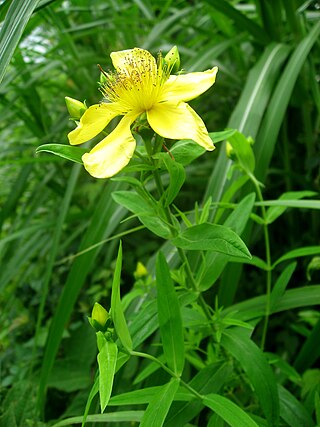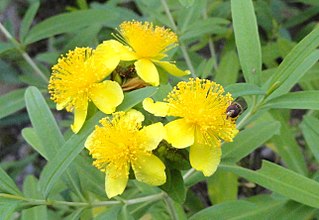
Hypericum canariense is a species of flowering plant in the family Hypericaceae known by the common name Canary Islands St. John's wort. It is the sole member of Hypericumsect. Webbia.

Hypericum maculatum, commonly known as imperforate St John's-wort, or spotted St. Johnswort, is a species of perennial herbaceous flowering plant in the family Hypericaceae. It is native to Europe and Western Asia where it grows in moist meadows.

Hypericum sphaerocarpum, the roundseed St. Johnswort or barrens St. John's wort, is a species of flowering plant in the St. John's wort family. It is native to the Eastern United States where it is primarily found in the Midwest and Mid-South as well as Ontario, Canada. Its preferred habitat is dry, calcareous glades and prairies.

Hypericum ascyron, the great St. Johnswort or giant St. John's wort is a flowering plant in the family Hypericaceae.

Hypericum boreale, also known as northern St. John's-wort, is a short-lived perennial species of flowering plant in the family Hypericaceae, section Trigynobrathys.
Hypericum buckleyi, known as Buckley's St. Johnswort, is a rare species of flowering plant in the family Hypericaceae that is found only in the Appalachian Mountains of the southeastern United States.

Hypericum kalmianum, commonly called Kalm's St. Johns wort or Kalm's St. Johnswort, is a flowering plant in the St. John's wort family Hypericaceae. It is native to the Great Lakes region in the northern United States and southern Canada. Hypericum kalmianum was named after its discoverer, Swedish botanist Pehr Kalm (1715-1779).

Hypericum canadense, known as Canadian St. Johns-wort, lesser St. John's wort, and lesser Canadian St. Johnswort, is a flowering plant in the genus Hypericum. It is a yellow-flowering annual or perennial herb native to North America and introduced to Ireland and The Netherlands. The specific epithet canadense means "Canadian".

Hypericum prolificum, known as shrubby St. John's wort, is a deciduous shrub in the genus Hypericum. It was named for its "prolific" number of stamens.

Hypericum tenuifolium, known as Atlantic St. John's-wort and sandhill St. John's-wort, is a species of flowering plant in the St. John's wort family, Hypericaceae. It is native to the Southeastern United States.

Hypericum suffruticosum, known as pineland St. John's-wort, is a species of flowering plant in the St. John's wort family, Hypericaceae. It is native to the Southeastern United States.
Hypericum galioides, the bedstraw St. Johnswort, is a species of flowering plant in the St. John's wort family, Hypericaceae. It is endemic to the Southeastern United States.

Hypericum tetrapetalum, the fourpetal St. Johnswort, is a species of flowering plant in the St. John's wort family, Hypericaceae. It is found in the Southeastern United States and Cuba. It was first described by Jean-Baptiste Lamarck in 1797.
Hypericum myrtifolium, the myrtleleaf St. Johnswort, is a species of flowering plant in the St. John's wort family, Hypericaceae. It is endemic to the Southeastern United States. It was first described by Jean-Baptiste Lamarck in 1797.

Hypericum virginicum, the marsh St. Johns-wort or Virginia marsh St. Johnswort, is a species of flowering plant in the family Hypericaceae. It is native to the central and eastern United States and eastern Canada.

Hypericum frondosum, the cedarglade St. Johnswort or golden St. John's wort, is a species of flowering plant in the St. John's wort family, Hypericaceae. It is native to the central and southeastern United States in dry, rocky habitats.
Hypericum erythreae, the Georgia St. John's-wort, sparse-leaved St. John's-wort, or grit St. Johnswort, is a species of flowering plant in the St. John's wort family, Hypericaceae. It is native to the southeastern United States in seepage bogs and roadside ditches. Its name grit St. Johnswort comes from its limited distribution, within the Altamaha Grit region of the Georgia coastal plain.

Hypericum fasciculatum, known as peelbark St. Johnswort or sandweed, is a species of flowering plant in the St. Johnswort family, Hypericaceae, native to the southeastern United States. It is found from eastern North Carolina, south to southern Florida, west to eastern Louisiana. Kew's Plants of the World Online database also notes that it occurs in Cuba, though Cuba is not listed in several other sources. It was first described in 1797 by Jean-Baptiste Lamarck.

Hypericum tubulosum, the lesser marsh St. Johnswort or southern marsh St. John's-wort, is a species of flowering plant in the family Hypericaceae. Formerly classified as synonym Triadenum tubulosum, the species is found across the Southern United States and Midwest. It grows in wetlands such as bogs and floodplains.

Hypericum walteri, the greater marsh St. Johnswort or Walter's marsh St. John's Wort, is a flowering plant endemic to the eastern United States, from Texas to Delaware north to Illinois. It grows along waterbodies such as lakes and streams, in marshes, and in swamp forests.
















